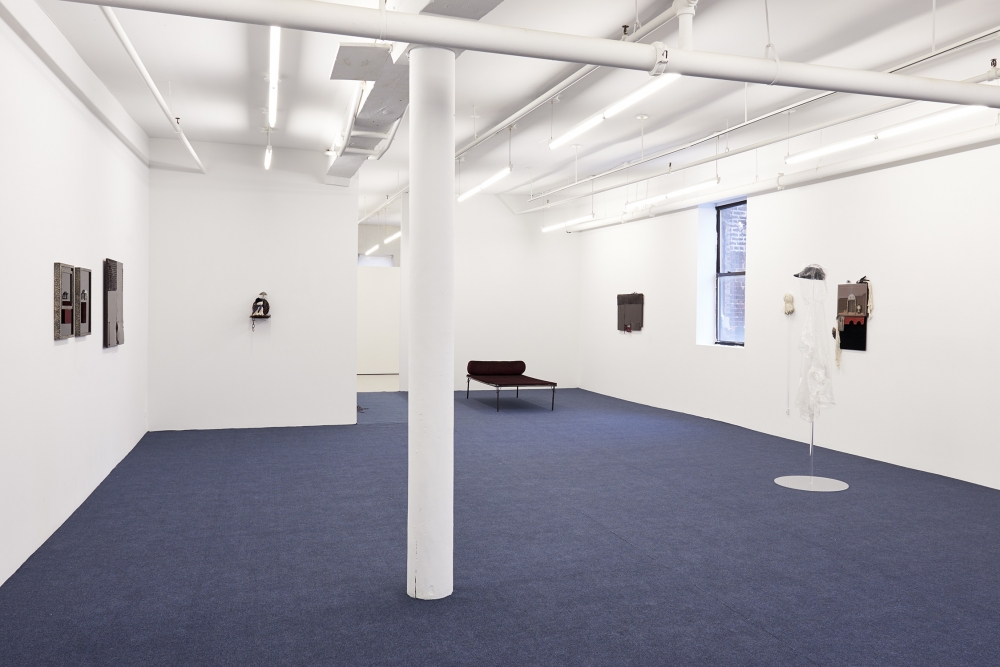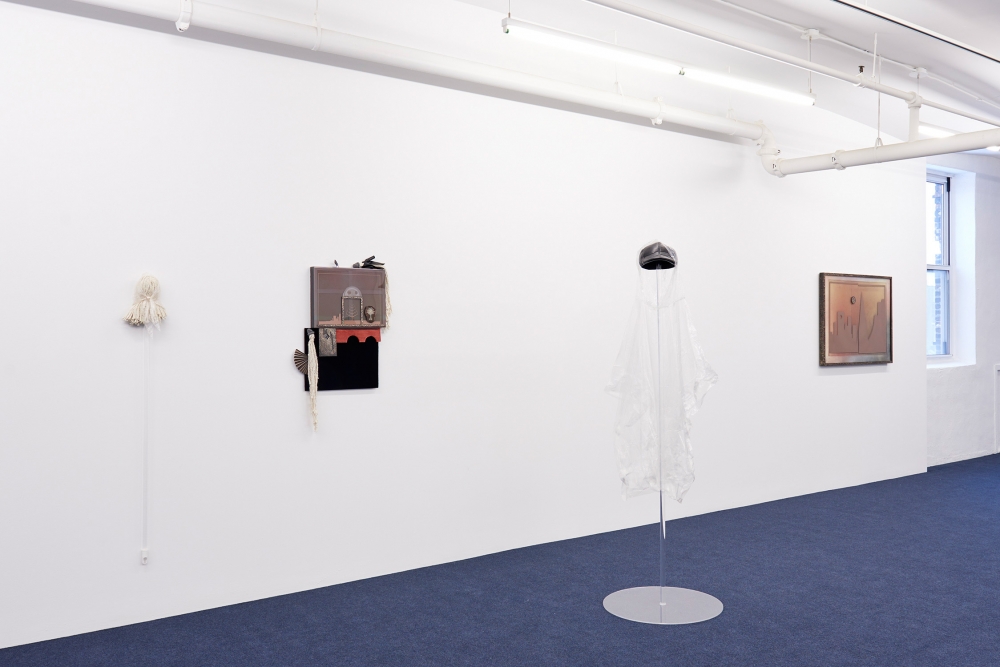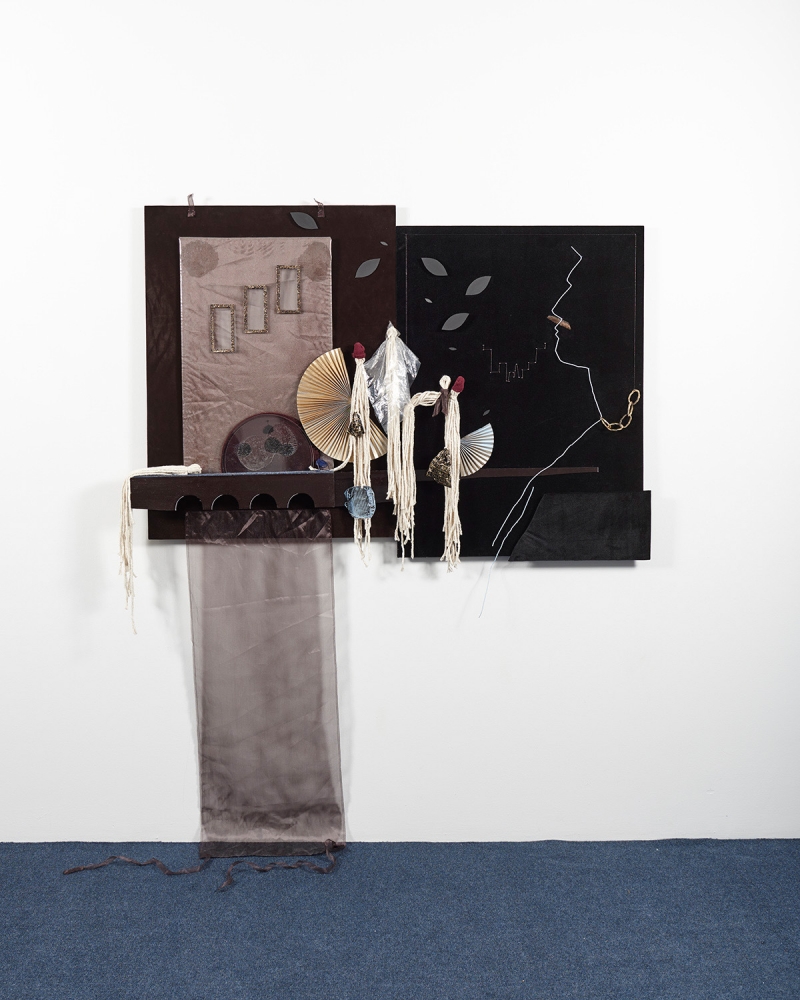Paul Kopkau channels the aesthetics of the urban elite Airbnb-dwelling class. In his debut solo exhibition Palm Crest & Suites — running at New York’s Company Gallery from January 8 to February 12 — the Yemenwed collective co-founder explores said online marketplace, and corporate temporary lodging in general, by remixing the image-poetics of sharing economy domesticity and luxury vacationing. The works have a critical orientation towards the societal functions of this milieu, but they are ultimately sharper for their sense of humor and evocative fiction-making than anything else.

The most memorable pieces in the show are the dioramas, namely the two ‘Palm Crest (full bloom)’ works and ‘The Fourth Season.’ Composing ambient, non-linear storylines culled from absentmindedly created memories, their casual disjointedness brings to mind Facebook’s automated (and completely unrequested) scrapbook function. Setting the works in motion are a cast of barely anthropomorphized mop figures caught lazing about in a frictionless dreamscape of endless vacation-time, occupied with sightseeing, shopping, and casual boredom. Kopkau created these characters in reference to Swiss-French architect and designer Charles-Édouard Jeanneret, aka Le Corbusier’s ‘modulor’ anthropometric proportion system used to aid in his designs, and they sit vaguely about the works like little horror specters without any bite, or really much affect at all. The joke is that where LC’s man-sized figures were part of an imperiously utopian vision of architecture, urban design, and society writ large, these mops just endlessly soak up waste into fibers, stylized to half-heartedly suggest fanciness.
Mops connect to the labor of washing, cleaning, and ultimately, the service industry — themes that recur in several works in Palm Crest & Suites, and form something of an obsessive underlying impulse in the show. Another barely-humanlike figure, ‘Valet,’ is adorned with a bike seat-like accessory for a hat and a clear plastic poncho, while completely lacking a material body. Labor conditions have seemingly worn down and cleaned the valet — someone whose job it is to parks patrons’ cars at upper-crust establishments — away so that there’s nothing of them left. One of the lazily cavorting figures in ‘The Fourth Season’ wears a poncho too, but as a preoccupied tourist they seem much more alive — at least they’re with their friends, having fun, surrounded by banal luxe-vibrancy. Fans also recur throughout the works, in analogue and electric form, where the circulation of air stands in for any kind of meaningful movement at all.

Palm Crest & Suites also features a number of abstract paintings and wall sculptures without modulor caricatures. These look more like artworks one would literally find in a Soho Airbnb, or in a upper-mid-market hotel in an east coast beach town, and all of them have a creepily antiseptic quality. The ‘City Suite’ series depicts what looks like an airbrushed urban skyline, working with soft and medium-soft juxtapositions of simple figures and floaty colors for the sake of ambiance. ‘City Suite #3 (Crest),’ meanwhile, pushes this airbrushed quality to an extreme, out of its comfort zone and into a gorgeously oozing film of obfuscation. Signifiers of home architecture such as walls, doors, and arches appear throughout the ‘Maroon Variance’ series, as well as the dioramas. Wrested from embedded-ness within architecture and scattered across these abstract works, they recall the process of de- and re-territorialization of domestic space by the rapid flow of capital, as well as the transformation of homes into image galleries for profiles on sites like Airbnb.
Where many of these works suggest an air of benign passivity, channeling the seen-but-not-noticed nature of the decorative styles they channel, ‘Mop-modular’ is the show’s most direct work. Featuring a standalone mop playfully posing with an umbrella on a wicker clam shell in visual reference to Botticelli’s ‘The Birth of Venus,’ it’s also the one most primed for social media circulation via selfies and Snapchat stories. Where the original Italian Renaissance painting depicts the goddess’ momentous, liminal state of arrival, ‘Mop-modular’ conveys the smoothness of going absolutely nowhere and ignoring how long it takes. Another standalone work is ‘Barcelona,’ a divan or cot-like piece of furniture in maroon velvet. In the context of the surrounding subject matter, it’s hard not to connect it to classic psychoanalysis imagery of the reclining, confessional analysand speaking to their unseen analyst. At the same time, it looks like a beach chair or something from a poolside VIP section, perfect for mixing Xanax with chewing gum after a glass of rosé. In this double motion, it suggests two homonyms of ‘unwinding’: relaxation, and a psychologically unhinged spiralling motion.

While, as a whole, Kopkau’s exhibition is able to tell a well-constructed joke with measured poetic sensitivity, its criticality ends up feeling more like an asset for its status as a commodity than a detractor. The questions it poses feel partially pre-fabricated and are tied up a little too neatly, risking over-investment in knowing ambivalence, as opposed to genuine irruption. Indeed, it’s not hard to imagine a few of these pieces ending up in apartments being rented out via Airbnb, barely noticed by their constantly refreshing scores of temporary tenants. When it comes to rewriting cities against existing inhabitants’ will in the name of entrepreneurship, the functional similarities between the art world and corporate sharing economy platforms should also not be ignored. Yet, while Palm Crest & Suites is at times compromised by low stakes, somewhat predictable parody, it manages to elaborate a charmingly weird approach to telling the story of mundanity.**













